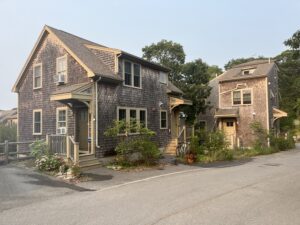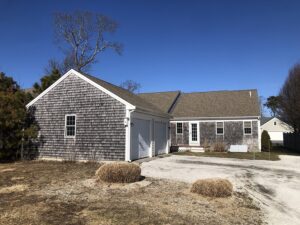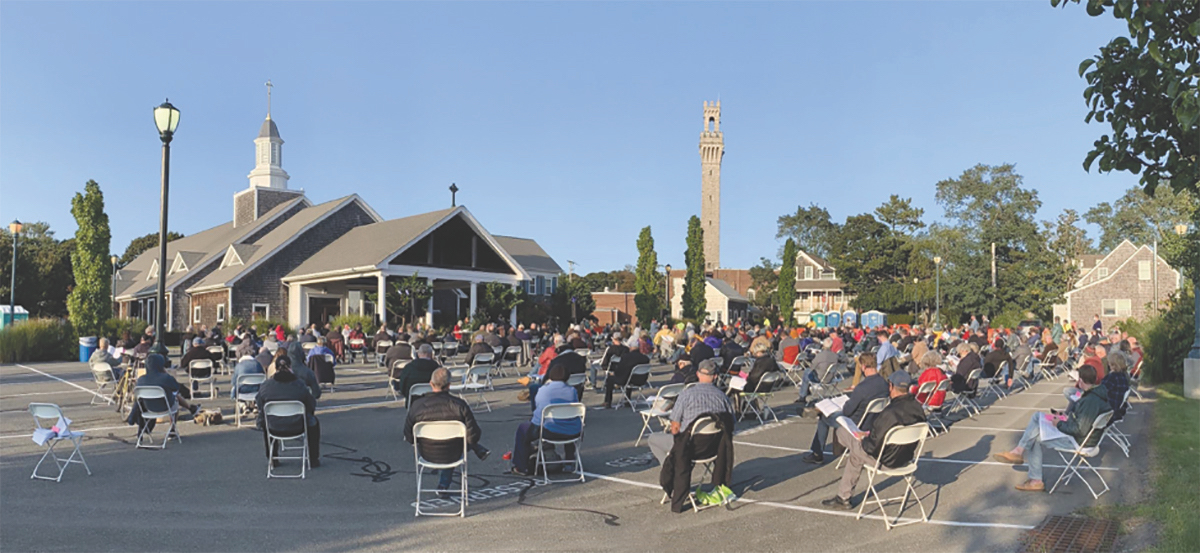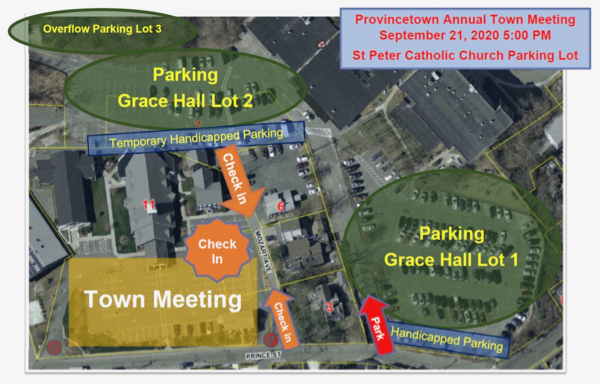PROVINCETOWN — Court records show that evictions at affordable housing in Provincetown are rare. The four largest managers of subsidized housing in town — the Provincetown Housing Authority, Community Housing Resource, The Community Builders, and the town itself, which owns the middle-income Harbor Hill complex — combined for only five eviction proceedings at Southeast Housing Court between 2020 and 2024.

The only eviction at the Stable Path apartments, a 23-unit development with 18 affordable units just south of Nelson Avenue, was for nonpayment of rent in 2018.
But last November, The Community Builders (TCB), which has taken over the administration of Stable Path from Community Housing Resource, which built the project, sent 30-day termination notices to two tenants after having sent notices of lease violations that August.
The two tenants — Tracey Primavera, 64, and Christopher Bellofatto, 62, who lived across the street from each other — signed court-supervised agreements with the company in February in which they each promised to refrain from specific behaviors that the court judged disruptive.
In June, Justice Donna Salvidio found that both tenants had broken their agreements, and she granted permission for the company to evict Primavera and Bellofatto.
Bellofatto moved out of his unit at Stable Path in July, but Primavera has not moved out of hers; she is seeking to appeal the judge’s order.
Road to Eviction
Primavera has lived at Stable Path since 2016 and is the primary caretaker for her father, 93, and a cousin, 58, who has intellectual disabilities, she told the Independent.
Bellofatto moved into the development in June 2024 after intermittent homelessness, he told the Independent, along with chronic health conditions he said were worsened by a car accident.

In TCB’s termination notice in November, the company claimed Bellofatto was violating his new lease by smoking, hosting overnight guests for an extended period, and creating disturbances by “routinely and loudly yelling.”
In the termination notice sent to Primavera that month, the company said she had “bullied, threatened, and targeted” other residents — by installing unauthorized cameras, recording tenants on video without their consent, and “contacting the police for a neighbor hanging wind chimes in the middle of the afternoon.”
That neighbor, according to court filings, was not Bellofatto but another tenant, Kristin Hatch, who is director of the Provincetown Housing Authority and who manages the Harbor Hill apartments for the town.
Primavera later told the court that her “previously friendly” relationship with Hatch had ended when she saw Hatch speaking with Bellofatto.
Both Primavera and Bellofatto accepted the Housing Court’s offer of mediation, and in February they each signed agreements that forbade them from interfering with the “quiet enjoyment” of other tenants in specific ways. Primavera was required to take down two outdoor cameras mounted on her home and refrain from disruptive behavior. Bellofatto was instructed not to have unauthorized guests stay longer than 14 days per year and to refrain from causing “disturbances or nuisance.”
According to court filings by TCB in May, however, Primavera kept one unauthorized camera and installed two new ones.
She also continued engaging in “combative and unneighborly” behavior, the company said — including filing a criminal complaint against Hatch for an incident that the Provincetown police had already concluded did not involve a crime.
According to subsequent filings, Primavera told the court that she had not understood the term “quiet enjoyment” in her February agreement — but “she signed it anyway because she knew she was doing nothing wrong.”
“Unfortunately, [Primavera’s] testimony only demonstrates she does not recognize the impact of her agitating and inciting conduct on others, nor does she take responsibility for the consequences thereof, despite prior warnings against engaging in conduct disruptions,” Salvidio wrote in granting TCB’s motion to evict. “It is clear” that Primavera had caused other residents to feel threatened, the judge wrote.
As for Bellofatto, the company alleged in a May 2 filing that he continued to engage in loud outbursts at night that alarmed neighbors and allowed an unauthorized guest to stay at his apartment after signing his agreement.
Bellofatto had violated his agreement “even though he understood a violation of the terms thereof could render him homeless,” Salvidio wrote in her June motion allowing TCB to evict him.
Bellofatto did not appeal Salvidio’s order and was evicted in July. He told the Independent last week that he is homeless again and living in his Jeep with his dog, Ralphy.
“Lease enforcement action taken by TCB is always a last resort,” the company said in a statement provided by public relations manager Jesse Migneault. “There is nothing we value more than the wellbeing and safety of the families who call this community home.”
An Appeal
Primavera sought a pause in Salvidio’s eviction order pending an appeal. Another Housing Court judge, Irene Bagdoian, granted her request on July 18 even though she wrote there was “nothing in the law” that would qualify Primavera for a stay.

Bagdoian wrote that the housing court has to weigh both “law and equity” and that Primavera’s father and cousin “are at serious risk of being rendered homeless because of the actions of the tenant.
“Even as the tenant seems unwilling to accept the consequences of her actions,” Bagdoian wrote, “this Court takes great pains to protect vulnerable parties.”
The stay is in place until another a hearing on Aug. 20. Meanwhile, Primavera must not communicate with Bellofatto or Hatch or engage in action that “threatens other tenants’ comfort, privacy, safety, and security,” Bagdoian ordered.
Primavera is also seeking new representation, having asked the court to remove lawyer Sara J. Kohls as her counsel because their relationship “has irrevocably broken down,” according to Kohls’s motion to withdraw on July 17.
On July 28, Primavera started an online petition asking supporters to “gently nudge our landlord/management to dismiss” the eviction order. As of press time, that petition has garnered more than 300 signatures.
After Mediation
Melissa Wheeler, TCB’s Stable Path property manager, told the court that eight police reports about disruptions at Bellofatto’s residence had been filed since the February agreement.
Bellofatto admitted that he violated his agreement and said it was his ex-partner — who was specifically barred from his unit by that agreement — who had stayed for 14 days.
“I want to take responsibility in this,” Bellofatto said. “I was evicted because I disobeyed the terms that I signed.” His ex-partner was homeless and had been hit by a car and hospitalized in Hyannis before his extended stay, Bellofatto said.
“I would do it over again,” Bellofatto said, because his ex-partner “is a human being” and needed help.
Primavera’s first police call about Hatch, in October, was about the wind chimes, but after signing her mediation agreement Primavera called the police about Hatch again and said that Hatch had tried to strike her with her vehicle. The police arrived unannounced at Hatch’s workplace before determining that no crime had been committed, the eviction filings say.
Primavera then filed a complaint with the same allegation at Orleans District Court.
Primavera’s online petition does not name Bellofatto but alleges grievances about a new resident who arrived in June 2024 and brought loud disturbances to the neighborhood “along with ‘alleged’ meth foot traffic 24 hours a day, 7 days a week,” she wrote.
Primavera did not provide evidence for her allegations about methamphetamine to the Independent and said she should limit her comments to the press “to comply with the Housing Court’s conditions of the stay.”
Bellofatto told the Independent that he does not use recreational drugs. “They thought I was using drugs,” Bellofatto said, because his ex-partner “was a user.”
Primavera told the Independent she found it “disturbing” that her allegations of drug activity were not addressed by TCB’s attorneys. She had argued in court that she was worried for her and her family’s safety.
Meanwhile, Hatch testified in court that Primavera’s actions had “taken away her comfort in her home.”
There were constant police responses to calls at Stable Path, she told the Independent. “I’d get texts from other neighbors: ‘Oh, my God, the police again,’ ” she said.
“All I ever did was live in my house and have wind chimes and drive to work,” Hatch added. “I don’t want anyone to get evicted.”




